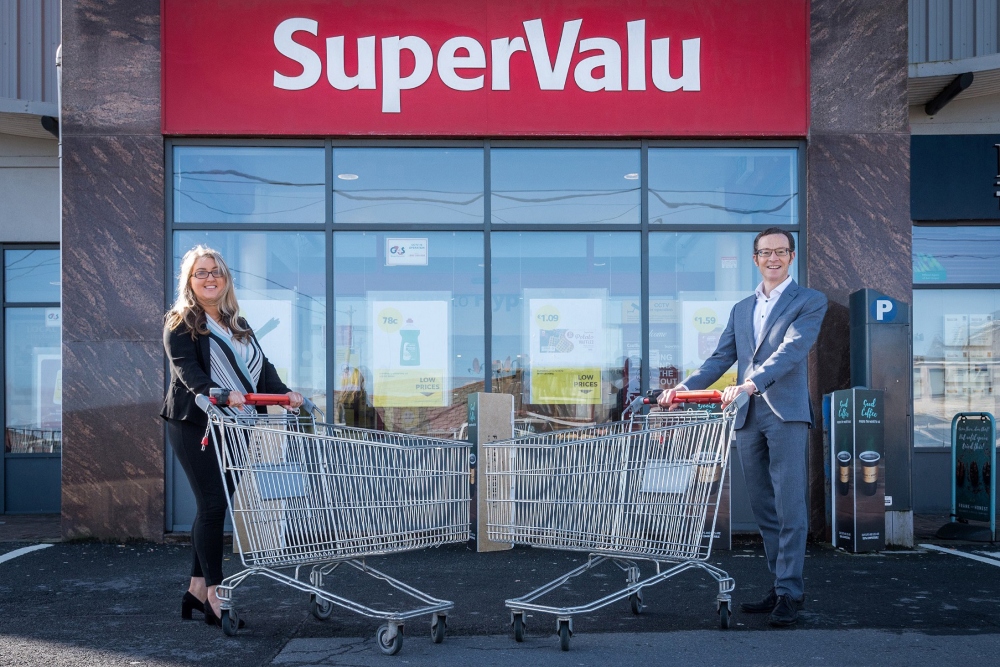Now is the time for grocery retailers to invest in their future and ‘Think Different’ urges Bank of Ireland head of Retail Sector Owen Clifford.
2020 was a year of unprecedented growth for the Irish grocery retail/convenience sector as it proved remarkably robust to meet the needs of the public in the first year of the Covid-19 pandemic.
As a result, the sector generated enormous trust and goodwill for the ability of its staff to support communities and the vulnerable in society.
“Retailers will need to ‘Think Different’ in respect of store revamps, investment in technology and their staff skill-set to sustain their business into the future”
According to Bank of Ireland’s head of Retail Sector Owen Clifford now is the time for the industry to invest in its future and “think different” as it grapples with a world of blended bricks and mortar and omnichannel e-commerce opportunities.
In his latest Insights/Outlook report on the Retail Convenience sector, Clifford noted how store revamp and purchase activity was particularly strong in H2 of 2020 and forecast that this will continue in 2021.
Despite execptional demand, the overall grocery supply chain proved robust which Clifford noted was a testament to the contingency plans in place by grocery operators/wholesalers.
A defining trend of 2020 was how shopping patterns reverted to the “big weekly shop” of yesteryear as the public limited their movements in response to the pandemic. However, this has led to a negative impact on gross margin percentage as less impulse and more considered shopping behaviours emerge.
He reported that retailers are continuing to implement pragmatic succession planning structures to ensure the long-term growth of their business and that in some ways Covid-19 has been a catalyst for retailer to investigate future options.
Strong pipeline of store revamps ahead

Owen Clifford, head of Retail Convenience sector, Bank of Ireland
Clifford said that a strong pipeline of store revamps and purchase activity was generated in H2 2020 and that progressive retailers recognise that in store investment is necessary to maintain customer engagement and loyalty.
Supervalu, Dunnes and Tesco continued to compete strongly for the number one spot in grocery market share; with Supervalu benefiting from its extensive community focused store network and online capability and Dunnes delivering a strong performance in the Dublin region.
Aldi and Lidl continue to maintain a strong foothold in the Irish market.
We asked Clifford about the new trends that will shape the grocery landscape of Ireland in the year ahead.
How did the Irish grocery/convenience retail sector weather the pandemic storm?
Grocery retailers are continuing to deliver a strong trading performance with annual sales increases of more than 20pc being reported nationwide. The less frequent/big weekly shop trend still continues with consumers, driven by health and safety concerns, visiting stores less often but spending more when in-store.
This type of shopping behaviour favours the larger grocery operators. An interesting dynamic has emerged in recent months with the larger operators seeking to retain market share and the convenience operators seeking to win it back.
Convenience operators have pivoted back towards grocery from being purely food-to-go/coffee-to-go focused and are now presenting themselves as a more accessible, top-up option. They have focused particularly on the large proportion of consumers now working regularly from home.
Will the pandemic change the shape of grocery/convenience retail going forward, particularly due to omnichannel?
The future of online grocery will also be under the spotlight in the coming months. The existing platforms were stretched when dealing with the unprecedented volumes over the past year leading to some consumer disengagement with the channel.
However, the current low levels (under 5pc of total grocery sales) conducted via online demonstrate that a real growth opportunity is available if a frictionless, efficient, reliable service can be delivered. It will be interesting to see if further partnership models develop via Ocado, Buymie, Deliveroo, Just-Eat or internal ‘dark stores’.
The cost of picking and delivery linked to the online channel remains a deterrent to retailers. I would expect a greater emphasis to be placed on user-friendly click and collect offerings from all the leading brands in 2021. The development of more intuitive/extensive brand apps linking personalised offers, loyalty rewards, click and collect, community initiatives and nutritional advice etc will be a priority for all brands to maintain customer engagement.
How are retailers preparing for their long-term future and what do they need to invest in?
The ‘value’ message will be key for all Irish grocery and convenience retailers in the coming months. It will be interesting to see if they focus on a purely price-led model. I believe that a more rounded approach is now required. Covid-19 has reminded us all of the importance of health, wellness and community.
Irish shoppers will certainly be more mindful of their sense of value to the community and the planet in their purchase decisions in the future. All of the major operators in Ireland have committed to reducing their carbon footprint via reduction in single-use plastic, food-waste and inefficient energy usage. The practical implementation of same will require investment and this has commenced in 2021 with increased use of solar panels, LED lighting delivered via recycled parts, roll-out of electronic labels etc being announced by Supervalu, Spar, Aldi and Lidl to date.
Aspects such as product authenticity, product traceability, healthiness and impact on the environment will all feed into our shopping preferences. It is incumbent on retailers to make the Irish consumer aware of their efforts/bona fides in this regard – active communication and engagement will be required. Competitive pricing will be important but the consumer will also expect more from their retailers.
An increased volume of revamp activity is expected in H2 2021 linked to restrictions in building etc during 2020/H1 2021. Detailed analysis pre and post revamp will be an imperative to ensure that the maximum return on investment is delivered via sales mix improvement, margin preservation/growth and cost saving. A robust investment plan draws on feedback from existing and targeted customers, employees, suppliers – it’s a holistic, interactive process ensuring that the retailer remains engaged with the customer and the wider community.
What are the threats on the horizon that family owned grocery/convenience retailers need to guard against?
Family owned retailers need to ensure that they are not driven into a price-led proposition in the coming months. Grocery and convenience retail, in comparison with many other sectors, has always been a high volume, lower margin-focused model. Margin preservation and cost management will be key elements for independent grocery retailers in a post Covid-19 world; those operating under the Supervalu, Centra, Eurospar, Londis and purely independent banners.
A price-led proposition as opposed to a “value” proposition is unsustainable in the long run for these operators. They need to play to their strengths; excellent customer service, accessibility, quality led offering in-store and proactive community engagement. They also need to ensure that the health and safety of staff and customers remains paramount in their agenda in the coming months.
The continuous development/training of personnel is also key to ensure that excellent standards are maintained in-store. Finally, to maintain customer engagement, investment in the store will need to be considered – As Henry Ford once said “If you continue to do what you always did, you will continue to get what you always got”. Retailers will need to “Think Different” in respect of store revamps, investment in technology and their staff skill-set to sustain their business into the future.
By John Kennedy (john.kennedy3@boi.com)
Published: 5 March 2021






